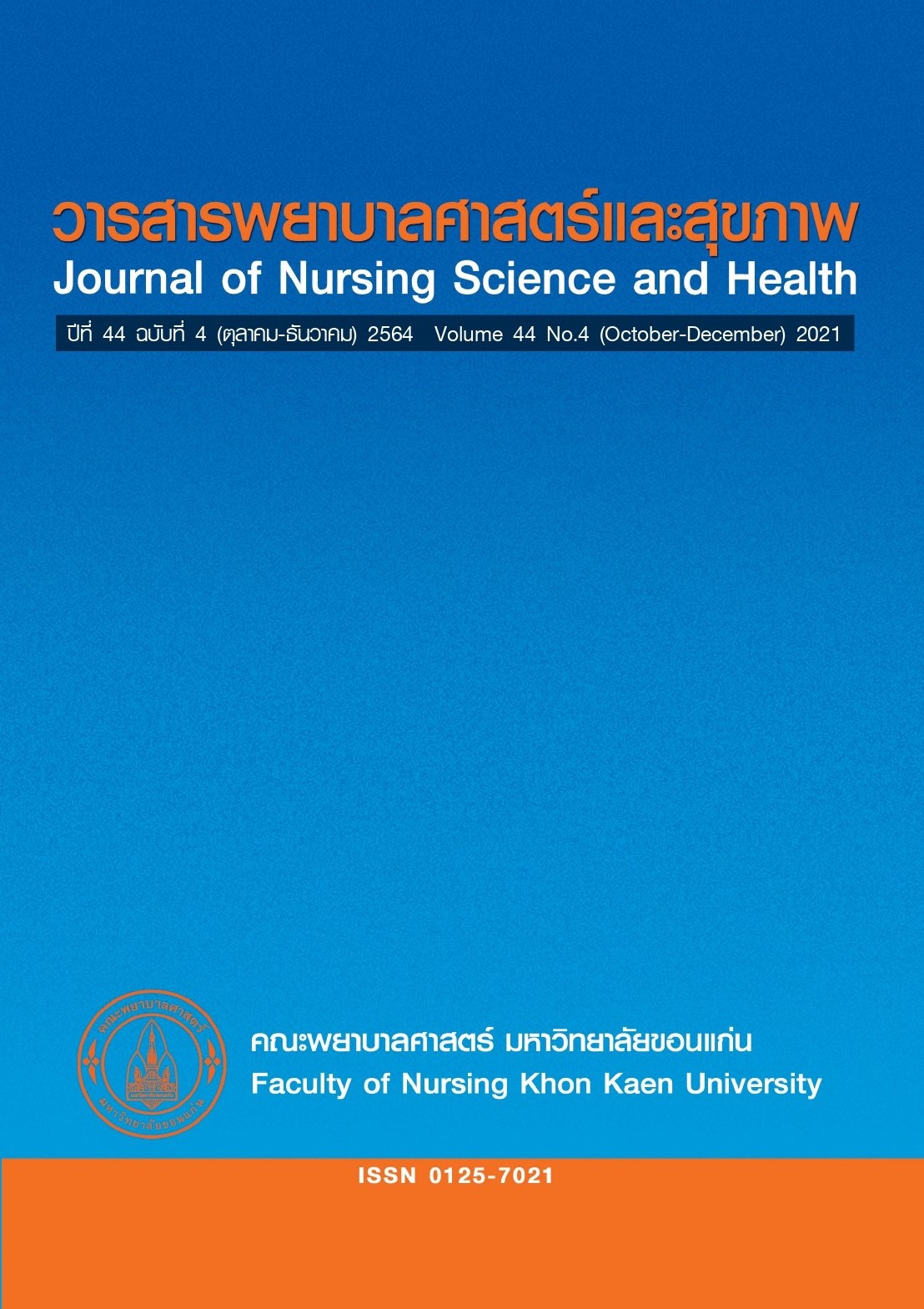ผลของการจัดการรายกรณีในโปรแกรมการดูแลแบบประคับประคองต่อความปวดและผลลัพธ์การดูแลแบบประคับประคองในผู้ป่วยมะเร็งระยะลุกลาม
คำสำคัญ:
การดูแลแบบประคับประคอง, การจัดการรายกรณี, ความปวด, ผลลัพธ์การดูแลแบบประคับประคอง, ผู้ป่วยมะเร็งระยะลุกลามบทคัดย่อ
การวิจัยเชิงทดลองแบบสุ่มและมีกลุ่มควบคุมนี้ มีวัตถุประสงค์เพื่อศึกษาผลของการจัดการรายกรณีในโปรแกรมการดูแลแบบประคับประคองต่อความปวดและผลลัพธ์การดูแลแบบประคับประคองในผู้ป่วยมะเร็งระยะลุกลาม กลุ่มตัวอย่างเป็นผู้ป่วยมะเร็งระยะลุกลามที่มีความปวด จำนวน 46 ราย แบ่งเป็นกลุ่มทดลองและกลุ่มควบคุม กลุ่มละ 23 ราย เครื่องมือที่ใช้ในการทดลอง ได้แก่ โปรแกรมการดูแลแบบประคับประคองในผู้ป่วยมะเร็งระยะลุกลามที่มีความปวด ผ่านการตรวจสอบความตรงเชิงเนื้อหาได้ค่าดัชนีความตรงตามเนื้อหา (Content validity index: CVI) เท่ากับ 0.98 วิเคราะห์ข้อมูลทั่วไปด้วยสถิติพรรณนา วิเคราะห์เปรียบเทียบความแตกต่างคะแนนความปวดระหว่างกลุ่มทดลองและกลุ่มควบคุม ด้วยสถิติทดสอบ แมน-วิทนีย์ ยู และเปรียบเทียบความแตกต่างของค่าเฉลี่ยคะแนนผลลัพธ์การดูแลแบบประคับประคองระหว่างกลุ่มทดลองและกลุ่มควบคุม ด้วยสถิติทดสอบอินดีเพนเดนท์ ที
ผลการวิจัยพบว่า 1) กลุ่มทดลองมีคะแนนความปวดโดยรวมลดลงกว่ากลุ่มควบคุม อย่างไม่มีนัยสำคัญทางสถิติ (p>0.05) แต่มีผลต่างค่าเฉลี่ยคะแนนความปวดก่อนและหลังการทดลองในกลุ่มทดลองลดลงกว่ากลุ่มควบคุม อย่างมีนัยสำคัญทางสถิติ (p<0.05) 2) กลุ่มทดลองมีคะแนนผลลัพธ์การดูแลแบบประคับประคองโดยรวมลดลงกว่ากลุ่มควบคุมอย่างไม่มีนัยสำคัญทางสถิติ (p>0.05) แต่มีผลต่างค่าเฉลี่ยของคะแนนผลลัพธ์การดูแลแบบประคับประคองก่อนและหลังการทดลองในกลุ่มทดลองลดลงกว่ากลุ่มควบคุมอย่างมีนัยสำคัญทางสถิติ (p<0.05) ดังนั้นจึงควรนำการจัดการรายกรณีในโปรแกรมการดูแลแบบประคับประคอง ไปประยุกต์ใช้ในการดูแลผู้ป่วยมะเร็งระยะลุกลามที่มีความปวด
เอกสารอ้างอิง
World Health Organization. WHO: Cancer [Internet]. 2018 [updated 2021 Mar 3; cited 2021 Jul 17]. Available from: https://www.who.int/healthtopics/cancer#tab=tab_1.
Strategy and Planning Division Ministry of Public Health. Public health statistics A.D. 2019; 2019 [cited 2020 Aug 15]. Available from strategy and planning division website: https://bps.moph.go.th/new_bps/sites/ default/files/statistic62.pdf. (in Thai)
World Health Organization. WHO guidelines for the pharmacological and radiotherapeutic management of cancer pain in adults and adolescents [Internet]. 2019; [cited 2021 Jul 17]. Available from:https://www.who.int/ publications/i/item/9789241550390.
Thai Association for the study of pain. Clinical practice guideline for cancer pain [Internet]. 2013 [cited 2019 Feb 10]. Available from: https://w1.med.cmu.ac.th/ family/knowledge/for-doctor/guideline/ 3543. (in Thai)
Toni W. Pain and factors affecting pain in end-stage cancer patients. Thai J Anesthesiol. 2018; 44(1): 1-4. (in Thai)
Kelleher SA, Dorfman CS, Vilardaga JPC, Majestic C, Winger J, Gandhi V, et al. Optimizing delivery of a behavioral pain intervention in cancer patients using a sequential multiple assignment randomized trial SMART. Contemporary Clinical Trials 2017; 57: 51–7.
World Health Organization. Palliative care [Internet]. 2018 [cited 2021 Jul 17]. Available from: https://www.who.int/ health-topics/palliative-care.
Palliative care center, Sakon Nakhon hospital, Palliative care statistics 2016-2018 [Unpublished]. Sakon Nakhon; 2018. (in Thai)
Case Management Society of America. CMSA: Standards of practice for case management [Internet]. 2016 [cited 2018 Sep 17]. Available from: https://www.abqaurp.org/ DOCS/2016% 20CM%20standards%20 of%20practice.pdf.
Strupp J, Dose C, Kuhn U, Galushko M, Duesterdiek A, Ernstmann N, et al.Analysing the impact of a case management model on the specialised palliative care multi-professional team. Supportive Care in Cancer 2018; 26(2): 673–9.
Nantachaipan P. Case management in palliative care. Nurse Journal 2015; 42(1): 153-8. (in Thai)
Nilmanat K, Sae-chit K. Effects of a case-based management nursing programs for terminally Ill patients on their perception of symptom-induced suffering and terminal care quality. JTNMC 2018; 33(3): 51-66. (in Thai)
Joo JY, Liu MF. Effectiveness of nurse-led case management in cancer care: Systematic review. Clin Nurs Res 2018; 28(4): 105477381877328.
Ozcelik H, Fadiloglu C, Karabulut B, Uyar M. Examining the effect of the case management model on patient results in the palliative care of patients with cancer. American Journal of Hospice and Palliative Medicine 2014; 31(6): 655–64.
Plas AGM, Deliens L, Watering M, Jansen WJJ, Vissers KC, Onwuteaka-Philipsen BD. Palliative care case management in primary care settings: A nationwide survey. Int J Nurs Stud 2013; 50(11): 1504–12.
Jirawatkul A. Biostatistics. 4th ed. Khon Kaen: KlungnanavitthayaPress; 2007. (in Thai)
Utthiya P, Amnatsatsue K, Kedmongkol P, Chansriwong P. Effects of case management program for older adults with end stage cancer in the community. J Public Health 2018; 48(3): 371-84. (in Thai)
Jirawatkul A. Statistics for health science research. 4th ed. Bangkok: Withayapat; 2009. (in Thai)
Department of Medical Services. Neurological institute of Thailand. clinical practice guidelines: Dementia. Bankok: Tanapress; 2014. (in Thai)
Chewaskulyong B, Sapinun L, Palliative performance scale for adult suandok. In: Chewaskulyong B, Aomwangprasert A, Jiraniramai Smaneeton B, Leerapan T, Mahaprom C, et al. editors. Palliative care. 2nd ed. Chiang Mai: Klang Wiang; 2009. p. 35-46. (in Thai)
Molek R, Binhosen V,Pakdevong N.Symptom intensity in persons with advanced cancer receiving palliative nursing care protocol and caregivers’ satisfaction. J Nurs Health Care 2015; 33(2): 102- 9. (in Thai)
Sapinan L. Manual for palliative care outcome scale: POS. ChiangMai: Klang Veing Publisher; 2013. (in Thai)
Ministry of Public Health. Department of medical services. institute of medical research and technology assessment. Appraisal of guidline for research & evaluation II: AGREE II [Internet]. 2013 [cited 2019 Apil 2]. Available from: https://www.bit.ly/2VkUDwE.
Petpichetchian W. Best nursing practice in cancer care. Songkhla: Chanmuang Press: 2011. (in Thai)
Sotiluk U, Wisesrith W. Effects of case management combined with palliative care model in patients with metastatic cancer on length of stay and quality of nursing care. JRTAN 2017; 18(18): 68-75. (in Thai)
Tomas RE, Wilson DM, Birch S, Woytowich B. Examining end-of-life case management: Systematic review 2014: 1-14. doi: 10.1155/2014/651681. PubMed PMID: 24999433.
Joo JY, Liu MF. Effectiveness of nurse-led case management in cancer care: Systematic review. Clin Nurs Res 2018; 28(4): 1-24.
ดาวน์โหลด
เผยแพร่แล้ว
รูปแบบการอ้างอิง
ฉบับ
ประเภทบทความ
สัญญาอนุญาต
วารสารพยาบาลศาสตร์และสุขภาพเป็นเจ้าของลิขสิทธิ์ในการเผยแพร่ผลงานที่ตีพิมพ์ห้ามผู้ใดนำบทความที่ได้รับการตีพิมพ์ในวารสารพยาบาลศาสตร์และสุขภาพไปเผยแพร่ในลักษณะต่าง ๆ ดังนี้ การนำบทความไปเผยแพร่ออนไลน์ การถ่ายเอกสารบทความเพื่อกิจกรรมที่ไม่ใช่การเรียนการสอน การส่งบทความไปตีพิมพ์เผยแพร่ที่อื่น ยกเว้นเสียแต่ได้รับอนุญาตจากวารสารพยาบาลศาสตร์และสุขภาพ



